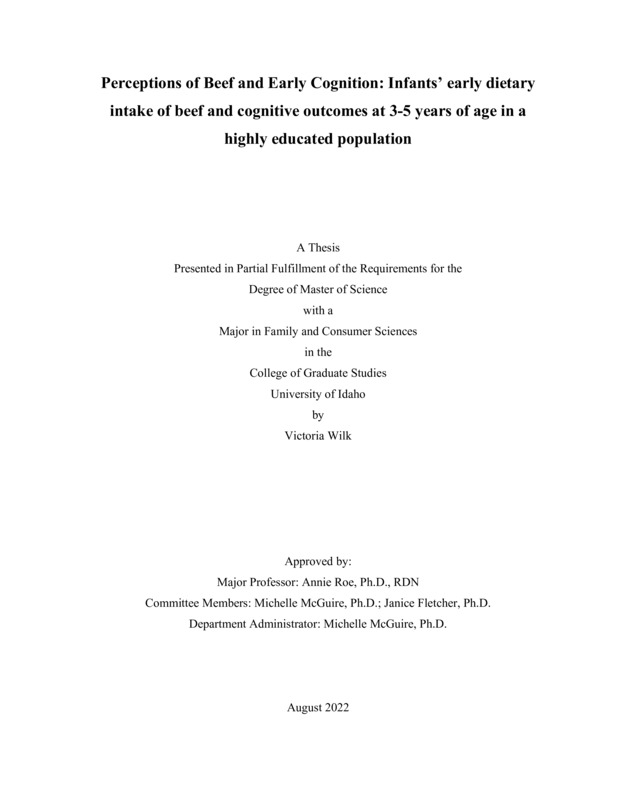Perceptions of Beef and Early Cognitive Development: Infants’ early dietary intake of beef and cognitive outcomes at 3-5 years of age
Wilk, Victoria Christina. (2022-08). Perceptions of Beef and Early Cognitive Development: Infants’ early dietary intake of beef and cognitive outcomes at 3-5 years of age. Theses and Dissertations Collection, University of Idaho Library Digital Collections. https://www.lib.uidaho.edu/digital/etd/items/wilk_idaho_0089n_12442.html
- Title:
- Perceptions of Beef and Early Cognitive Development: Infants’ early dietary intake of beef and cognitive outcomes at 3-5 years of age
- Author:
- Wilk, Victoria Christina
- Date:
- 2022-08
- Keywords:
- Beef Child Cognition Nutrition
- Program:
- Family and Consumer Sciences
- Subject Category:
- Nutrition; Behavioral sciences; Developmental psychology
- Abstract:
-
Background: Previous studies have shown that iron and zinc can improve various cognitive aspects in humans when eaten in the form of beef. These nutrients are essential to infants and are often limiting in their diet after six months of age. Little research has assessed the connection between beef as an early food in infants and cognitive outcomes later in life. The purpose of this study was to describe Idaho parent/caregiver early beef introduction practices and perceptions when feeding their infant, and to determine relationships between frequency of early beef consumption in infancy and cognitive outcomes at 3-5 years of age.Methods: A convenience sample of 32 children between the ages of 3 and 5 years (mean age: 51.0 ± 9.6 months) was recruited from Moscow, Idaho and the surrounding towns. Parents or caregivers of each child filled out a survey about their feeding practices and perceptions of beef as a first food for their children. Parents/caregivers also completed a food frequency questionnaire about the foods they fed their child when they were between the ages of 6 months and 12 months. The NIH Toolbox for Assessment of Neurological and Behavioral Function (NIHTB) was administered to children, which involved a series of 5 games on an iPad; Flanker Inhibitory Control and Attention, which measured attention and inhibitory control; List Sorting Working Memory, which measured working memory; Dimensional Change Card Sort, which measured cognitive flexibility and attention; Pattern Comparison Processing Speed, which measured processing speed; and Picture Sequence Memory, which measured episodic memory. Relationships between cognitive scores and dietary intake of the children were assessed via Spearman Rank correlation, and food frequency questionnaire and survey data were summarized via descriptive statistics. Results: Parents focused on nutrition and food safety when choosing early complementary foods for their infants. When buying beef, parents saw beef as a nutritious option and valued low costs and high nutritional value, while being wary of chewing and choking hazards for their child. Infants aged 6-12 months were estimated by their parents to consume 4.09 ± 7.01 g of beef per day, providing 0.11 ± 0.19 mg of iron and 0.24 ± 0.41 mg of zinc. The average daily total iron intake at 6-12 months of age was 9.79 ± 10.28 mg and the average daily totally zinc intake at 6-12 months of age was 6.79 ± 6.75 mg. Daily beef intake (r = 0.41, p =0.02), daily iron intake from beef (r = 0.41, p =0.03), daily zinc intake from beef (r=0.42, p=0.02), and daily zinc intake (r = 0.45, p =0.01) were positively associated with the Flanker Inhibitory Control and Attention Score. Only the relationship with total zinc intake remained significant when outliers were removed (r=0.52, p=0.01). When outliers were removed, daily zinc intake was also positively associated with scores of Picture Sequence Memory (r=0.45, p=0.04) and Fluid Cognition composite score (r=0.64, p=0.03). Conclusions: Idaho parents/caregivers of infants value nutrition and safety when choosing beef and other early complementary foods. Iron and zinc found in beef, as well as zinc in the diet, may have a positive relationship with fluid cognition, specifically attention and inhibitory control, between the ages of 3-5 when consumed as an infant between the ages of 6-12 months.
- Description:
- masters, M.S., Family and Consumer Sciences -- University of Idaho - College of Graduate Studies, 2022-08
- Major Professor:
- Roe, Annie
- Committee:
- McGuire, Michelle; Fletcher, Janice
- Defense Date:
- 2022-08
- Identifier:
- Wilk_idaho_0089N_12442
- Type:
- Text
- Format Original:
- Format:
- application/pdf
- Rights:
- In Copyright - Educational Use Permitted. For more information, please contact University of Idaho Library Special Collections and Archives Department at libspec@uidaho.edu.
- Standardized Rights:
- http://rightsstatements.org/vocab/InC-EDU/1.0/

